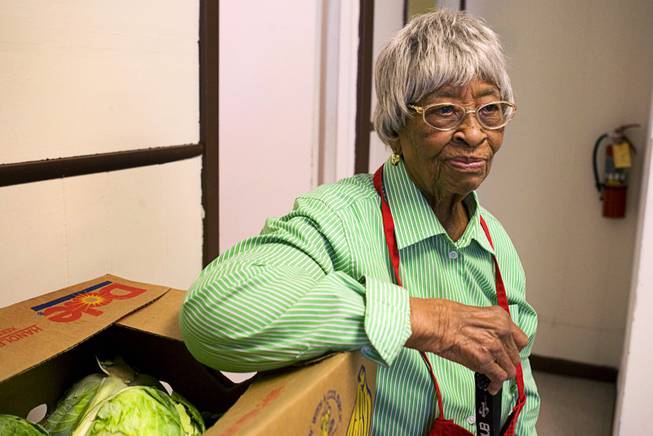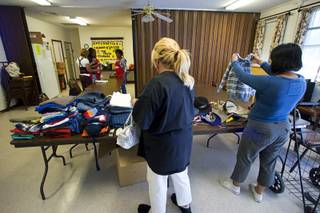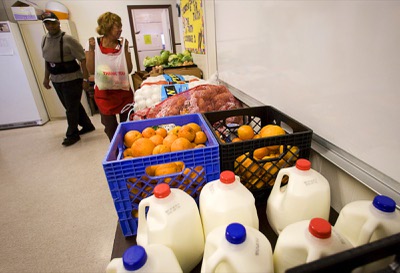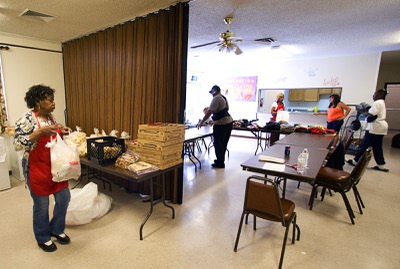
Audrey James, 97, supervisor of the Fish Inc. program, is shown at the Calvary Southern Baptist Church in North Las Vegas Wednesday, April 27, 2011. The program provides emergency food assistance to people who are struggling to get by.
Monday, May 2, 2011 | 2 a.m.
Sun Archives
- Helping the homeless a labor of love for jobless woman on a journey (4-18-2011)
- Men’s stories unfold amid act of kindness at homeless veterans event (3-28-2011)
- New facility will provide shelter, structure for homeless youth (3-21-2011)
- Homeless Nevada family finds community online (1-22-2011)
- Homelessness and the indignity of hurtful speech (12-5-2010)
- Photographers donate time, portraits for homeless youth (12-3-2010)
- Needy escape cold weather for hot Thanksgiving meal (11-25-2010)
- Hostile toward homelessness (9-26-2010)
- I am frightened (8-29-2010)
- Las Vegas shortchanged in federal funding for homeless (8-18-2010)
Calvary Southern Baptist Church
Some work jobs that pay less than 10 bucks an hour. Others receive a combination of unemployment benefits, Social Security and food stamps. Few earn more than $1,200 a month.
Once a month they pass through the Fish Inc. food relief program that’s linked to the Calvary Southern Baptist Church in North Las Vegas. They come in twos and threes, no more than 20 in all on Mondays, Wednesdays and Fridays. Some are embarrassed. Many are frustrated, confused. Their world feels broken, and their reality is dominated by hunger. When they arrive, they’re greeted by a team led by Audrey James, who possesses the empathy of someone who has known what it means to be viewed as something less.
She was rejected by mainstream society, treated as a second-class citizen, denied the most basic rights for many of her early years. She was born in 1914 in rural Mississippi, a black woman living in the heart of the Jim Crow South. Her mind remains strong. So too her voice. She walks gingerly with a cane, the result of a broken hip three years ago. For some seniors that’s considered a death sentence. James has moved ahead.
As a child, her family had a 120-acre farm in Columbia, Miss., enough land to raise hogs, cattle, vegetables and fruit. The hunger and despair of Depression-era Mississippi were bad for many, but James says there is a fundamental difference between the nature of hunger then and now. “We were lucky. We were on the farm,” she says. “When you have a farm, you have food.”
Hunger in the Las Vegas Valley takes many forms in the third year of the Great Recession. There are the underemployed who work but are barely paying their bills, seniors who live on fixed incomes and have to decide between food and medication, the tens of thousands who have lost or are in the process of losing their homes, the more than 150,000 people who the state considers unemployed, and the estimated 15,000 homeless who wander the streets.
You might notice them, maybe not. Some appear to be haggard, angry. They wear tattered clothes, drive aging vehicles if they can afford $4-a-gallon gasoline, take the bus, ride a bike or walk.
Others dress the part of the office worker or midlevel executive, own a good vehicle, somehow hang onto their homes despite lacking a regular paycheck. No single brush paints the face of hunger in our community. Yet, it’s bad.
“This is the worst, the last three years have been worse than ever,” James says. “We have people who were working good jobs and lost their income. Engineers, construction workers, blackjack dealers, a lot of minimum-wage people. They come here tired, hungry, embarrassed.”
One in eight households in Nevada struggles with hunger, and researchers estimate that hunger costs all Nevadans half a billion dollars from the direct and indirect costs of lost productivity and negative health outcomes, according to a February 2010 report by Three Square Food Bank.
Nevada’s food insecurity rate, a measure of hunger and the fear of starvation, increased to 12.4 percent of households in 2008, compared with 10.4 percent in 2007. “Very low food security” increased to 4.6 percent from 4 percent over the same time period. Nearly 250,000 people experience food insecurity in Clark County, and, of those, nearly 100,000 people experience very low food security. From August 2008 to August 2009, Nevada’s food stamp caseloads grew 53.1 percent, the highest growth of any state. For the six-month period that ended in July 2009, food pantries that partner with Three Square had distributed as much food as they did in all of 2008.
Talk with key players in this region’s food banks and they will tell you the numbers have probably gotten worse since that report was released, with hunger reaching beyond the low-income and working-class populations and now hurting the middle class.
Although the numbers say our region’s unemployment rate hovers at 14 percent and the underemployment rate is 23 percent, analysts speak of hundreds of thousands of Southern Nevadans who at the height of the economy worked off the books, making money in the “gray market.” They remodel and repair our homes and vehicles, landscape our yards, cut our hair, work as casino hosts and escorts.
You see the reality in their eyes, particularly those of the first timers at the Food Inc. food bank. They avert the gaze of strangers, head down, shoulders slumped. Approach them to talk and some willingly engage, others are reluctant. They’re just trying to get through the day. It speaks to a sense of displacement that you truly can’t understand unless you’ve lost your job, your income, your home, your family and any sense of hope since the recession began.
Many of our elected officials, business executives, government employees, in fact many of us who have been fortunate to hold onto our jobs and homes, do not understand the depth of personal despair so many of our neighbors are experiencing, isolated in their houses, apartments or on the streets with no workplace to go to, a lost sense of purpose, questioning every decision that brought them to this moment. They question whether they should have moved to Southern Nevada, wonder when they will find work, how they will feed their families. You sense that the clock is ticking on whether they will stay or go, but to where? The job picture isn’t much better elsewhere.
Chad Flores was earning $3,500 a month as a lot manager at United Nissan. He lost his job last summer. The circumstances are unclear. “In car dealerships there’s a lot of politics,” he says. “They bring in a new manager, you lose your job.” No matter, he’s hungry. Flores’ wife and six kids ages 6 to 19 have moved to Tacoma, Wash., to live with her mother. He’s stayed behind to look for work, anything. He’s turned in applications at Wal-Mart, Home Depot, Lowe’s. “Everywhere you go there’s no jobs,” he says. “I’d rather take a minimum-wage job than nothing at all, but I can’t find one.”
He’s come to James’ Fish Inc. for the first time. They supply him with vegetables, fruit, meat, canned goods, and macaroni and cheese donated by Three Square and pizza provided by Pizza Hut. KFC also gives regular donations of chicken to the program. The three plastic grocery bags of food Flores holds are expected to last for a week.
Recipients often share with family members, friends and neighbors. They are required to show a driver’s license and Social Security cards for their children before they are given food. The goal is to limit fraud. Flores is clearly embarrassed to be in the church’s Fellowship Hall, but he has no cash in his pockets, and he’s living with his sister, who’s visibly frustrated by the whole arrangement. He appears to be shaky, out of sorts and feels powerless in a community where $100 casino chips are tossed around like candy.
As a child, James heard stories of another sort of power gap, a great-uncle who lost his farm to whites in rural Mississippi. She says they just took his land, his crops, unable to bear to see a black man succeeding in the post-Reconstruction South. They told him he didn’t need the land. He’d be just fine on his own.
He lost it all and so too did his descendants. That sort of family lore stays with you for a lifetime and can’t help but define your worldview, no matter how long you live. “Poverty crosses all lines,” James says, “but the blacks get the worst of it, even here. They don’t get the opportunities. They don’t get the jobs. It happens more undercover here, but it happens. You can’t visualize that. You can’t see that. It’s an awful feeling. It’s caused a lot of young blacks to be afraid to venture, to try.” James’ great-grandma was a slave. Her great-grandpa was a white slave owner who owned great-grandma. Their daughter’s skin was light enough that she passed for white.
James speaks of Rosa Parks, the seamstress who refused to give up her seat for a white passenger, sparking the Montgomery Bus Boycott of 1955, long-considered a turning point in the civil rights movement and the emergence of the Rev. Martin Luther King Jr. James smiles when asked about Parks. As a teenager in 1930s Mississippi, James rebelled and decided that she would enter a local restaurant through the front door. She was told: “You can’t come in. You can’t come in. You need to go through the other door.” James wouldn’t listen. It didn’t make sense to her. She tried again. After several more attempts she gave up, recognizing the futility of the endeavor.
Twenty-five years later she and her husband, Isaiah, had moved to Las Vegas, where he was a construction worker and she was a schoolteacher. It’s often a forgotten part of Las Vegas’ past, but blacks were routinely barred from the hotels and restaurants until the 1960s except to work there, and that happened to the Jameses for much of the next decade, a legacy of the power equation that some say continues in this region. Isaiah James died in 1984 at age 80, and for the past 27 years, Audrey James has overseen the operation of Fish Inc.
The nonprofit organization operates on an annual budget of no more than $3,000. Her assistant, Loretha Smith, keeps the books. She’s 84. James’ niece, Judye Patricia Conner, a retired school principal, also helps out. The trio along with their team of regular volunteers have seen a great deal of hunger and uncertainty pass through their doors since 2008. There’s no telling when the hunger crisis will let up or how much deeper the challenges will become, but it’s clear that James’ longevity offers a perspective that can be lost on others in the worst of times. Just as certain as the spring follows winter, this daughter of the segregated South is convinced that good times follow the bad.




Join the Discussion:
Check this out for a full explanation of our conversion to the LiveFyre commenting system and instructions on how to sign up for an account.
Full comments policy